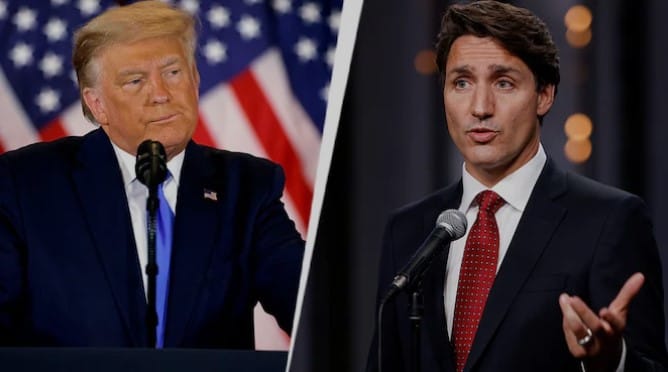A Brewing Economic Storm Between the US and Canada
The long-standing trade partnership between the United States and Canada is now facing one of its toughest challenges yet, as tariffs imposed by US President Donald Trump spark retaliatory measures from Canada and Mexico. The 25% tariff on imports from these neighboring nations, coupled with an additional 10% tax on Chinese imports, has ignited a wave of economic uncertainty and diplomatic tension.
Canadian Prime Minister Justin Trudeau has urged citizens to prioritise locally made goods in an effort to cushion the economic blow. Meanwhile, Mexico has vowed to counteract the tariffs with its own set of trade restrictions. In response, China has also announced its intent to take “corresponding countermeasures” and file a complaint with the World Trade Organisation (WTO).
As these new policies come into effect, global leaders are weighing in, expressing concerns over potential economic disruptions and inflationary risks. France’s Industry Minister Marc Ferracci has warned that the European Union may need to take action, while US businesses brace for higher costs and reduced consumer spending.
Trade Tensions Spill Over into Sports and Public Sentiment
The impact of these tariffs extends beyond politics and the economy—it is now shaping cultural interactions. In a striking display of discontent, Canadian hockey fans recently booed the US national anthem before a game between the Ottawa Senators and the Minnesota Wild. This reaction reflects growing frustration among Canadians who feel that their close alliance with the US is being threatened.
Public sentiment across Canada and Mexico has shifted, with calls for boycotts of American goods and a push for stronger domestic industries. Many Canadians are choosing to vacation within their country instead of traveling to the US, while businesses are actively seeking alternative suppliers outside the US market.
The Panama Canal: A New Front in the Trade Dispute
Trade disputes are not confined to North America. US Secretary of State Marco Rubio’s recent visit to Panama has reignited tensions over control of the Panama Canal. Rubio warned that the US may take “necessary measures” to counter what he described as growing Chinese influence in the region.
Panama’s President José Raúl Mulino, however, downplayed the threat of military intervention, suggesting technical discussions instead. Yet, Trump’s assertion that Panama has “broken” its neutrality promise and his hints at reclaiming the canal by force have added a new layer of geopolitical strain to an already volatile trade landscape.
Economic Fallout: The Price of Protectionism
Trump has justified the tariffs as a means to address concerns related to illegal immigration and drug trafficking, but economists warn of significant economic repercussions. Businesses in the US, particularly small and mid-sized importers, are already feeling the strain. Fred Sanchez, the owner of a California-based importing company, stated that he might have to shut down operations due to the rising costs of Mexican goods.
Meanwhile, former Secretary of State Mike Pompeo has downplayed concerns over inflation, suggesting that businesses will absorb the costs. However, many economists argue that tariffs inevitably lead to higher consumer prices and reduced purchasing power.
Global Reactions and Future Trade Relations
The international community is closely watching how this trade conflict unfolds. The European Union has criticised the tariffs, stating that they could harm global economic stability. The UK has also voiced concerns, emphasising the need for strong trade relations with the US.
Within the US, Senate Minority Leader Chuck Schumer has stated that lawmakers will explore legislative measures to block the tariffs, highlighting bipartisan resistance to Trump’s economic strategy.
A Shift in Economic Alliances?
One of the most pressing questions emerging from this trade dispute is whether Canada, Mexico, and other affected nations will seek to reduce their economic dependence on the US. Canadian Finance Minister Dominic LeBlanc has acknowledged that the country may need to renegotiate its trade agreements, while former Liberal Party leader Michael Ignatieff has warned that trust in the US as a reliable economic partner is eroding.
With retaliatory tariffs set to hit a range of US exports—including dairy, meat, wine, and manufactured goods—businesses on both sides of the border are preparing for a turbulent period ahead. If these trade barriers remain in place for an extended period, economists predict that Canada and Mexico could enter a recession, with significant job losses in key industries.
What Lies Ahead?
The coming months will be critical in determining the future of North American trade relations. If negotiations do not ease tensions, the economic impact could be severe, affecting industries ranging from agriculture to manufacturing and technology. As businesses, policymakers, and consumers brace for potential fallout, one thing remains clear—this trade war is just getting started, and its consequences could reshape the global economic landscape for years to come.




